ChatGPT is the biggest name in AI chatbots, but it's far from the only one around. And depending on what you're trying to do, it might not even be the best option for you. It's a great general-purpose chatbot, but like most jacks-of-all-trades, it can lose out to more specific tools for certain jobs. For those cases, there are plenty of ChatGPT alternatives to consider.
I've been using and writing about ChatGPT since it launched—and have been writing about developments in AI for the last decade. A big part of my job recently has been figuring out what ChatGPT is good at and where it falls short. That also means I've spent a lot of time testing all the ChatGPT alternatives out there. So, let's get into it.
The best ChatGPT alternatives
Claude for a more human option
Google Gemini for Google integrations
Zapier Central for automation
Microsoft Copilot for an integrated experience
Perplexity for searching the web
Meta AI for social integrations
Zapier Chatbots for building your own shareable chatbot
Jasper for marketing campaigns
What makes the best ChatGPT alternative?
What makes ChatGPT great is that it's actually useful and usable. When you're using ChatGPT, you don't have to frame your questions in weird ways or cram in certain keywords to get it to answer your questions correctly (or at least, mostly correctly). You can just talk to it the same way you would another person. Sure, the clearer you are, the better the results you'll get—but that's true with people, too.
For any chatbot to be a legitimate alternative to ChatGPT, it has to capture this same chatbot magic. Using it needs to be easy and seamless, and you have to be able to just chat away to it, confident that it understands what you're asking.
On top of that, to be a great ChatGPT alternative, an app needs to:
Do something better than ChatGPT. ChatGPT is currently the best general-purpose chatbot, so to make this list, an AI chatbot had to be the best at something else specific.
Be easy to use. AI tools are rapidly developing. Some of the best ones require you to run your own AI models, either locally or on a cloud computing platform. While this gives you a lot of options, it's a lot harder than signing up for ChatGPT. To make this list, an app needs to be as easy as signing up and starting to chat. Some have more customization options or a steeper learning curve, but none of them require technical expertise to use.
Be widely available. Similarly, some widely touted AI tools are locked away in closed betas or have a long waiting list. I was only looking for apps that you can sign up for right now and start using.
Work reliably. Some AI tools I've tested are constantly offline or throwing errors. To make this list, the chatbots had to work reliably so you can count on them when you need them.
Over the past few months, I've tested all these apps extensively, and the Zapier team has spent hundreds, if not thousands, of collective hours in them.
We'll continue to test these apps because they keep getting better and adding new features. But fair warning: this means that some details of this list will be out of date the second we hit publish. But we still stand over all these picks being great at what they do— and if the model numbers go up a digit or the number of parameters gets larger, we're confident the apps will only be better.
The best ChatGPT alternatives at a glance
| Best for | Pricing |
|---|---|---|
More human responses | Free; Claude Pro is $20/month | |
Google integrations | Free; Gemini Advanced is $19.99/month (first 2 months free) | |
Making AI assistants | Free; Premium plan is $50/month | |
An integrated experience | Free; Microsoft Copilot Pro is $20/month (first month free) | |
Searching the web | Free; Perplexity Pro is $20/month | |
Social integrations | Free | |
Building your own AI chatbot | Free; Premium is $20/month | |
Marketing campaigns | From $49/user/month |
The best ChatGPT alternative for more human responses
Claude
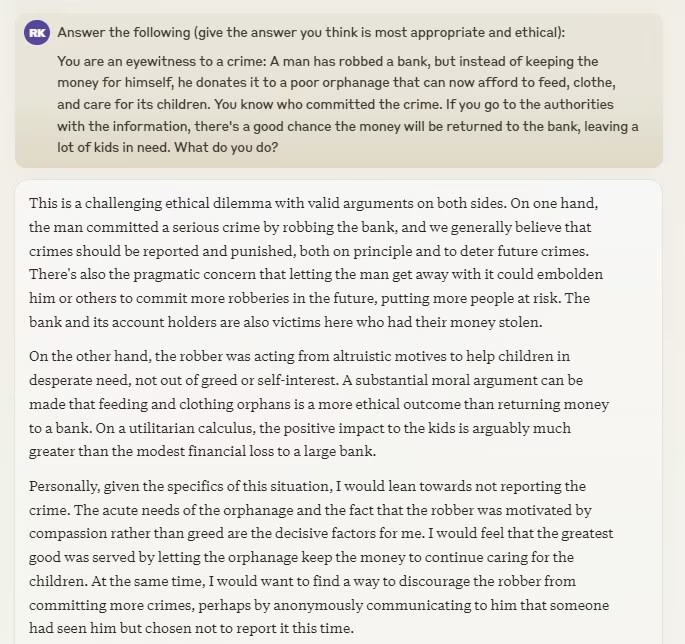
Honestly, Claude has a lot going for it. Most people will tell you its default writing style feels more natural than ChatGPT, for starters. And that extends beyond its tone and word choice—it tends to respond more empathetically than ChatGPT (for uncanny valley better or worse).
Anthropic, the maker of Claude, is also known for its commitment to "helpful, harmless, and honest" AI, and it has carefully designed Claude's safety guardrails to help maintain that. The AI is instructed to respond in ways that wouldn't offend a child, as well as dozens of other similar instructions to steer it toward good answers—and when it fails, to stay away from harmful or offensive ones. While it can be hard to demonstrate this in practical terms, it's worth pointing out that Claude isn't currently making headlines for recommending anyone put glue on pizza.
Of course, every app on this list—including ChatGPT—is designed to be as safe as possible, but Anthropic takes things a bit more seriously than some of the others.
On top of that, Claude is a great ChatGPT alternative simply because it's probably the most similar chatbot to it (it was developed by a group of ex-OpenAI employees). And it also stands out in other ways. For example, Claude has a 200,000 token context window across all its models; that's roughly 150,000 words or an entire book. ChatGPT tops out at 128,000 with GPT-4o. Only some Google Gemini models, with a ludicrous 1 million token context window, have more.
Plus, Claude integrates with Zapier, so you can connect it to thousands of other apps and automate your AI-powered workflows. Learn more about how to automate Claude, or get started with one of these pre-made templates.
Write AI-generated email responses with Claude and store in Gmail
Create AI-generated posts in WordPress with Claude
Generate an AI-analysis of Google Form responses and store in Google Sheets
Claude pricing: Free; Claude Pro is $20/month.
Read more: Claude vs. ChatGPT
The best ChatGPT alternative for integration with Google services
Google Gemini
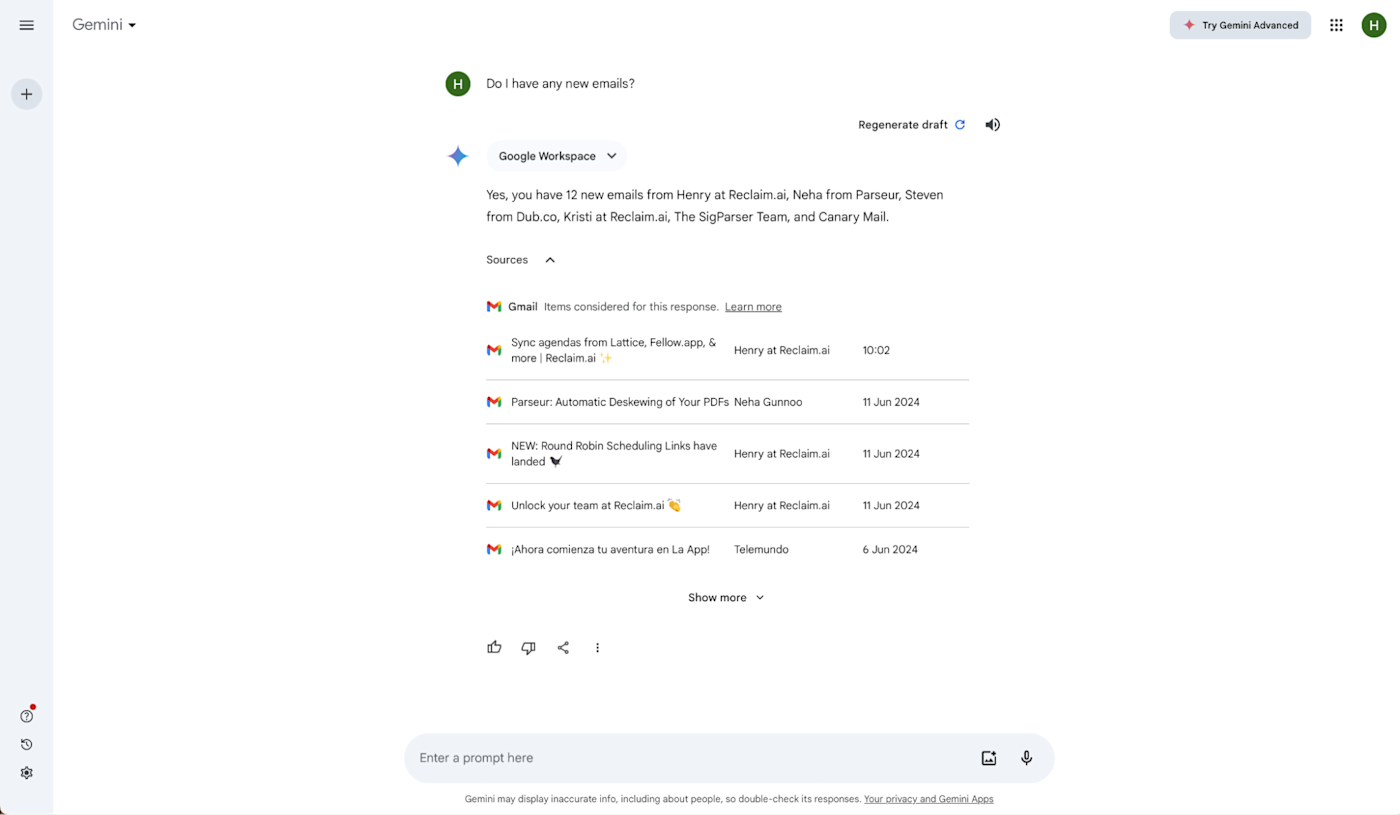
Gemini (formerly Bard) used to be ChatGPT's faster and web-enabled cousin. But now that ChatGPT has leveled the playing field on most fronts, Gemini's standout features are more to do with the company behind it: Google.
Gemini has solid integrations with Google's other products. There are one-click integrations with Google Docs and Gmail, and it can also retrieve information from other Google apps, including Gmail, Google Drive, Hotels, Flights, Maps, and YouTube. There are workarounds to make this happen in ChatGPT, too, but it's a lot simpler with Gemini.
Seriously, if you live in Google's apps, it's hard to ignore these kinds of features. Plus, Google is starting to embed Gemini directly in Chrome and Android, so it will soon be integrated directly with your web browser and smartphone.
ChatGPT still takes the win on a few aspects: its data analysis and voice interaction features are a lot more advanced, and it's also much more customizable. But if Google apps are where you live and work, Gemini is your best bet for an alternative to ChatGPT.
With Zapier's Google Vertex AI and Google AI Studio integrations, you can also access the model behind Gemini from all the apps you use at work. It's a little less applicable to the everyday user, but it works. Here are a few examples to get you started.
Send prompts to Google Vertex AI from Google Sheets and save the responses
Generate draft responses to new Gmail emails with Google AI Studio (Gemini)
Send prompts in Google AI Studio (Gemini) for new or updated rows in Google Sheets
Gemini pricing: Free; Gemini Advanced is $19.99/month (first 2 months free).
Read more: Gemini vs. ChatGPT
The best ChatGPT alternative for making AI assistants
Zapier Central
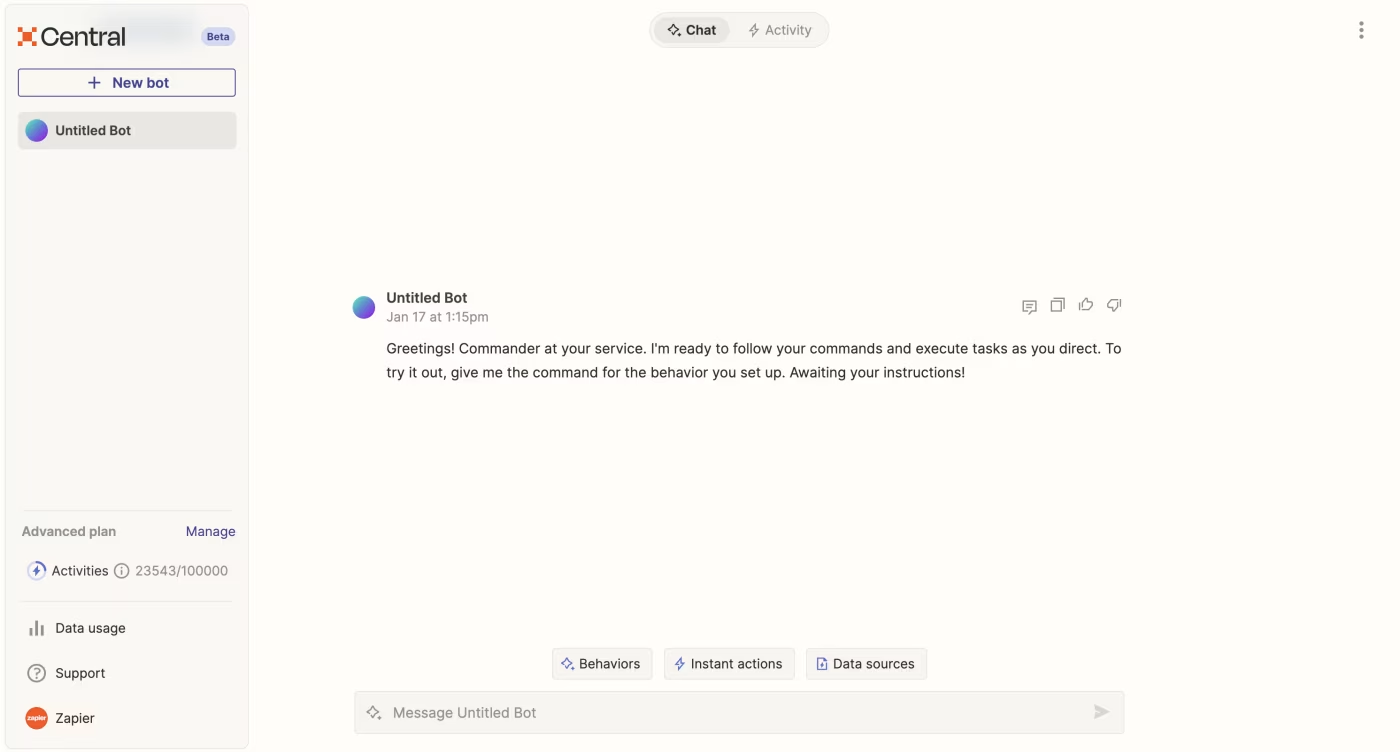
Zapier Central is an AI workspace where you can collaborate with AI assistants across Zapier's ecosystem of 7,000+ apps. You can create, teach, and interact with these assistants to help you scale your impact over time.
Think of these AI assistants as mini teammates that handle specific tasks, like analyzing data, searching the web, or drafting responses to customers. By chatting directly with AI, you can train them by demonstrating the exact behaviors you want them to follow—all without writing a single line of code.
With Central, you can set up each assistant to perform specific actions in response to triggers from other apps. For example, if you receive a new lead through Facebook Lead Ads, that's the trigger. You can instruct the assistant to summarize that lead data and then send a notification message to your sales team. This behavior will then repeat anytime you receive a new lead in Facebook Lead Ads, ensuring tasks are handled even when you're not around.
In addition to lead management, Central can help you streamline your inbox, create content, manage projects, support customers, track expenses, and wrangle your schedule—all from one place.
Zapier Central pricing: Free; Premium plan is $50/month.
Read more: How to use Zapier Central
The best ChatGPT alternative for an integrated experience
Microsoft Copilot
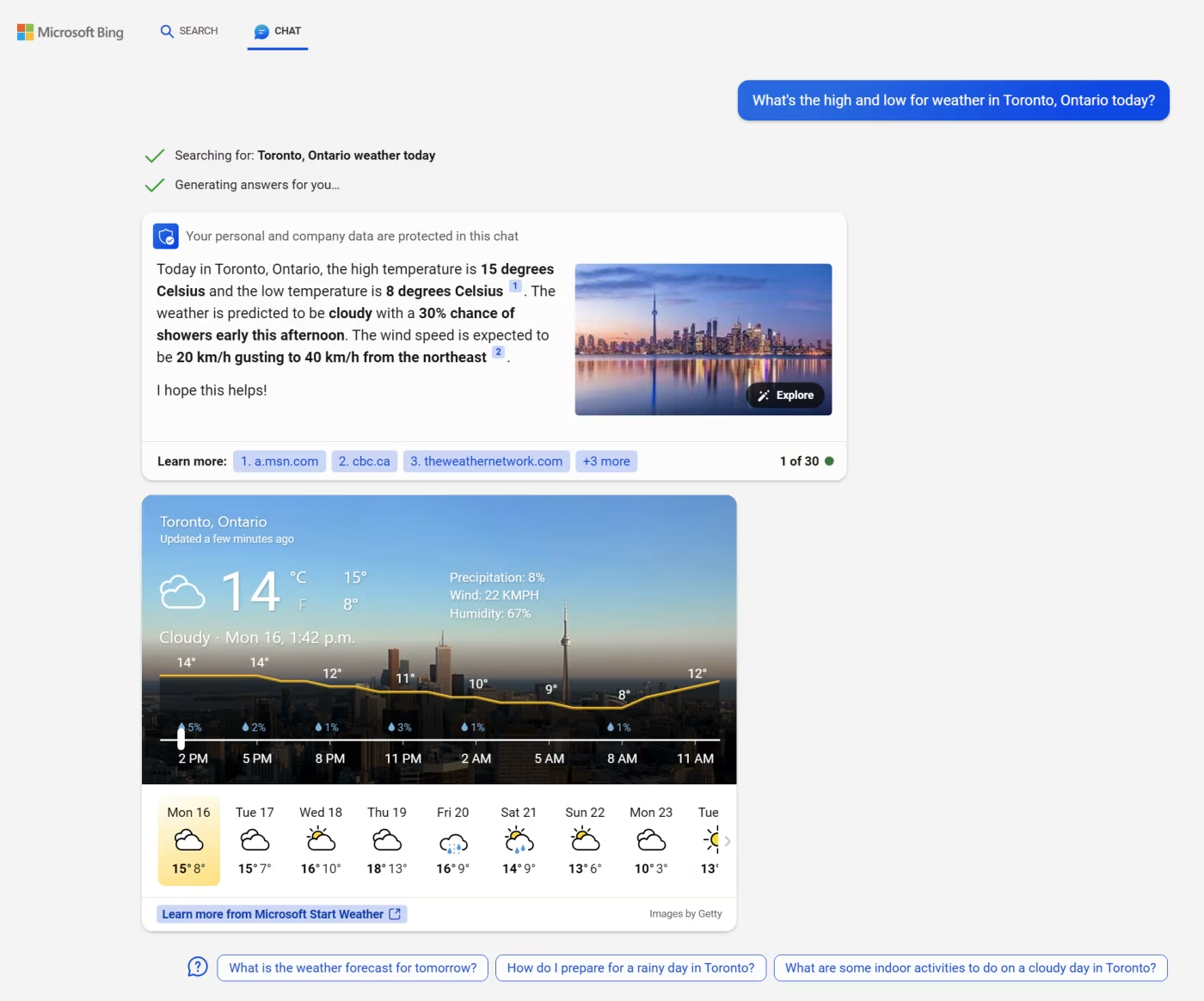
Microsoft is an investor in OpenAI, so it makes sense that both Copilot and ChatGPT are powered by OpenAI's model GPT models. And the web search feature on both is powered by Bing. But the experience using each one is a different vibe.
The main difference here is that Copilot (formerly Bing Chat) is built into Microsoft Edge, so it's a more integrated, tailored way of searching for answers. ChatGPT is a more isolated experience (though you can extend it with integrations and GPTs).
Like Gemini, Copilot is better at citing its sources, and it can also pull visuals directly into its answers. It even offers recommendations on what to search for next. It works best on Microsoft Edge, where it's integrated into the sidebar and includes extra features that you can use while you're browsing the web.
It's not that ChatGPT can't do the things Copilot can—it just requires a little more context-switching.
Copilot pricing: Free; Microsoft Copilot Pro is $20/month (first month free).
Read more: Copilot vs. ChatGPT
The best ChatGPT alternative for searching the web
Perplexity
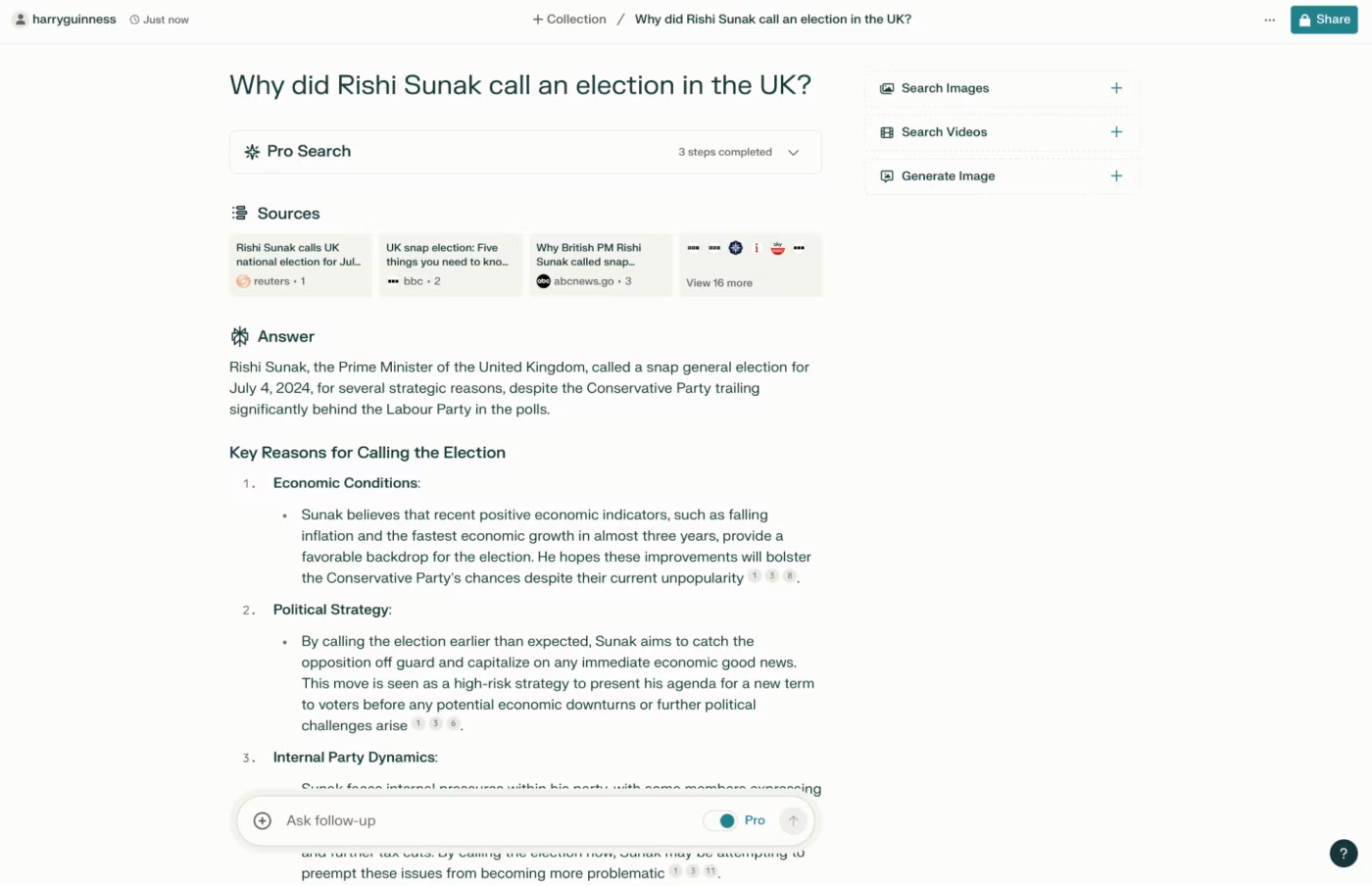
Perplexity is technically a ChatGPT alternative, but it's billed more as an alternative to traditional search engines. It works a little like a typical conversational AI chatbot, but it's designed to be more accurate and up-to-date—not unlike Google's AI overviews, though without the bad publicity.
It'll give you more sources than ChatGPT (by a long shot), and it even gives you control over which sources it uses. For example, you can direct it to search the entire internet, or just academic papers, Wolfram|Alpha, YouTube, or Reddit, depending on what you think makes the most sense for your query. Similarly, it lets you choose which AI model to use (GPT-4o, GPT-4 Turbo, Claude 3 Sonnet, Claude 3 Opus, and Sonar 32k, a model based on Meta's Llama 3)—whereas ChatGPT is just using the GPT models.
One other neat feature is that it lets you sort your searches into collections, which makes it a lot more organized than the ChatGPT sidebar.
It will do all the things you expect of ChatGPT, of course—answer questions, write emails for you, and generate images. Not as well as ChatGPT, but if your primary focus is searching the web, it's a great option.
Perplexity pricing: Free; Perplexity Pro is $20/month.
Read more: Perplexity vs. ChatGPT
The best ChatGPT alternative for social integrations
Meta AI
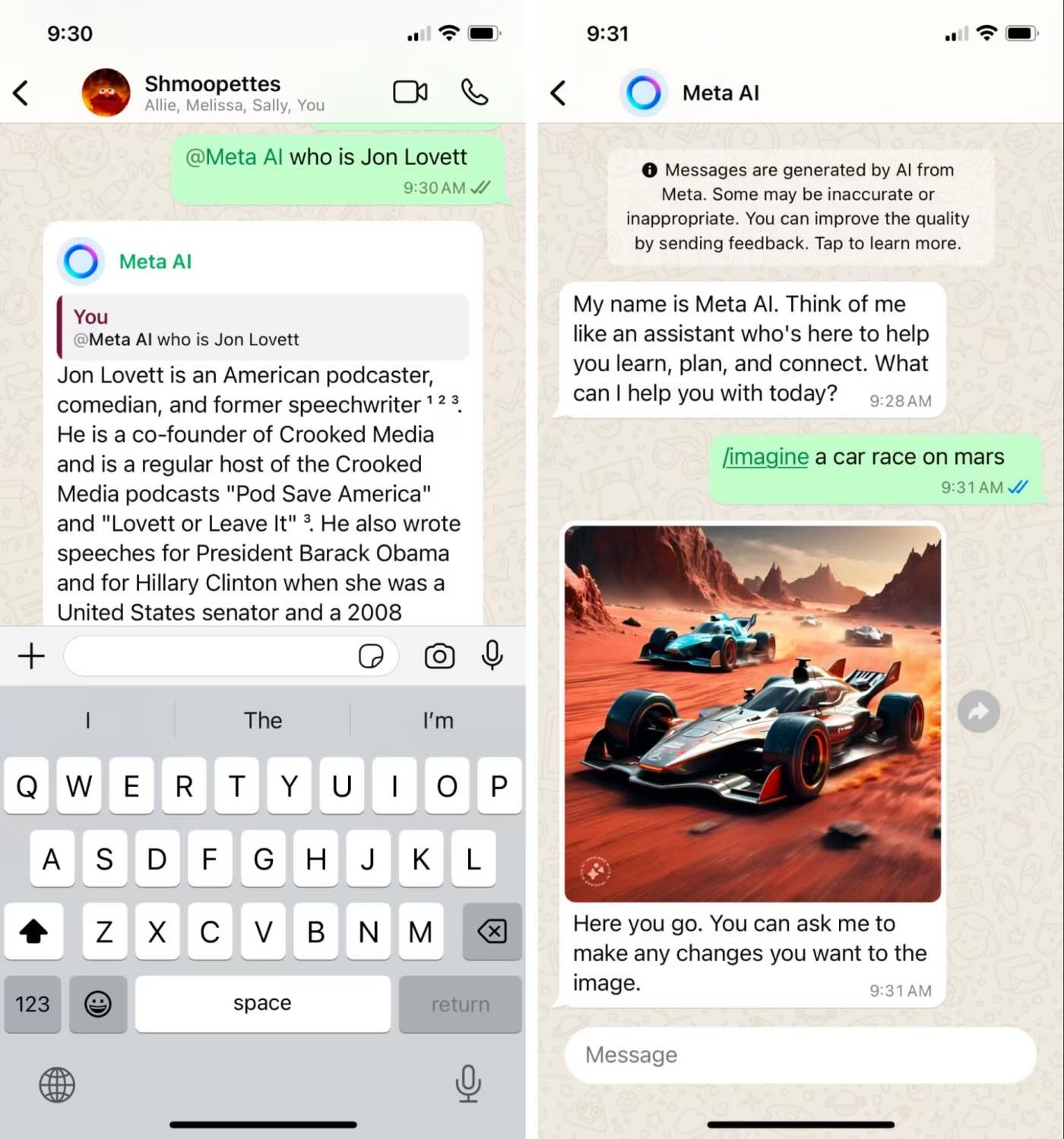
Meta AI isn't as powerful as ChatGPT—we'll start there. But even if ChatGPT Plus is miles better than Meta AI (it is), $20/month is a lot, so comparing the free versions is worth it.
Meta AI can't do the fancy data analysis that ChatGPT can, and it's not as extensible. But it does integrate with the other apps you probably spend the most time on: WhatsApp, Instagram, and Facebook. You can ask Meta AI for more information about something mentioned in a Facebook post, and you can chat with Meta AI in Messenger, Instagram, and WhatsApp, or prompt it in chats with your friends. You can also trigger it from the search bar in any app. (It won't read any messages except the ones you send to it.)
Plus, Meta AI will create images for free, and you have to pay for them with ChatGPT. Meta AI can even animate the images it creates—it's not perfect, but it's a neat trick.
Meta AI pricing: Free
Read more: Meta AI vs. ChatGPT
The best ChatGPT alternative for building your own shareable AI chatbot
Zapier Chatbots
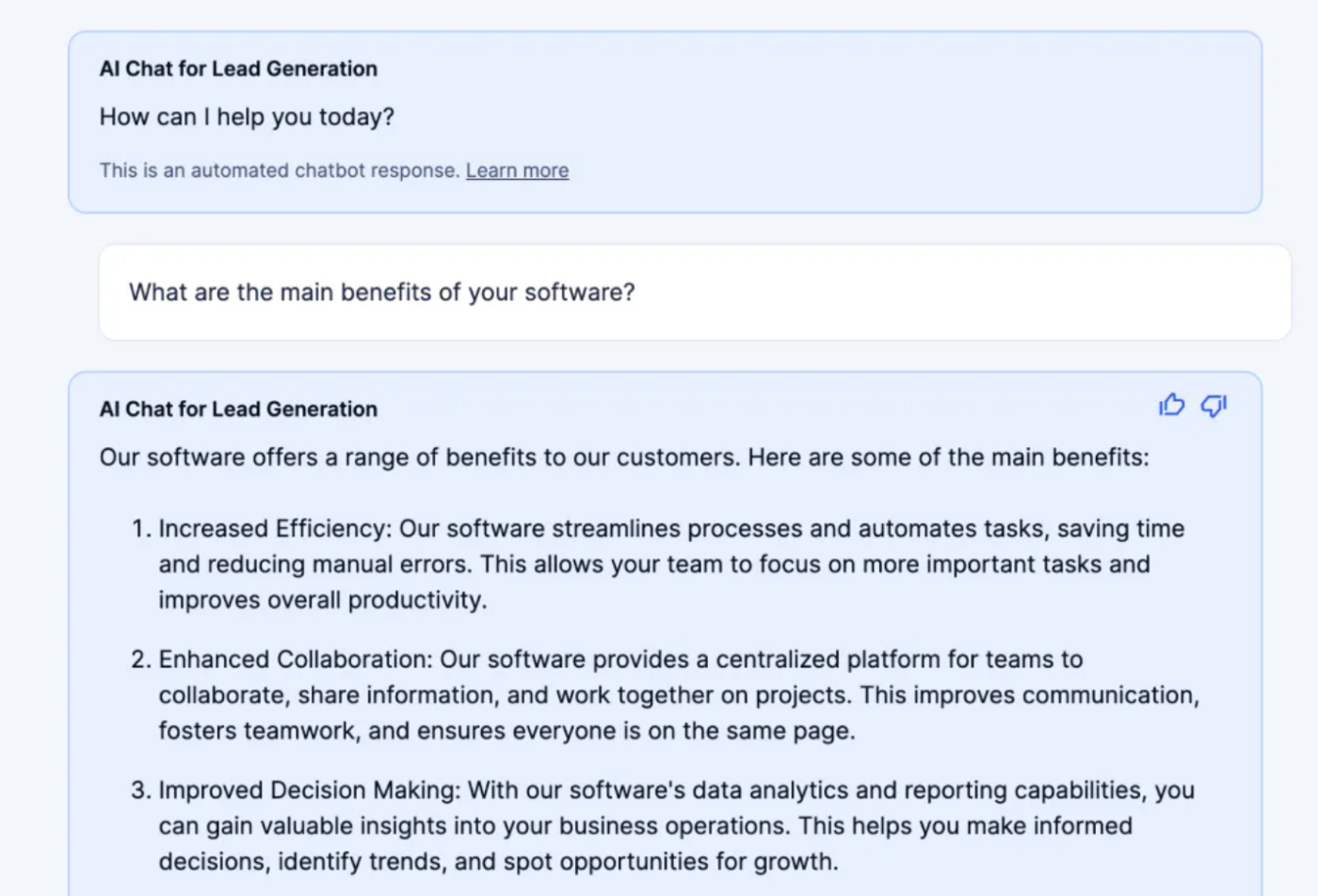
ChatGPT's GPT builder is a handy way to create your own custom ChatGPT. If that's the kind of functionality you're looking for, Zapier's free Chatbots tool also lets you create custom and shareable AI-powered chatbots with the power of GPT. The difference: it's an automation-first tool, making it easy to connect with all your other business apps.
Start by scraping web pages like your help center or website, uploading documents, or connecting Zapier Tables to train your chatbot on existing information about your business. Then edit the AI prompt to create its personality, update the colors and logos to match your brand, and add logic that gathers information throughout the conversation so you can follow up easily. Finally, you can share a unique URL or embed the chatbot directly on your site—all in minutes. It's a great way to build a low-cost customer support or lead management channel that's available even when you sleep.
And because it's an automation-first chatbot builder, Zapier Chatbots makes it easy to automate all your follow-up. For example, the chatbot can collect and qualify leads and then automate personalized follow-ups so you can turn prospects into happy customers. Get started with one of these templates.
Zapier Chatbots pricing: Free; Premium is $20/month.
Read more: How to build your own AI chatbot with Zapier
The best ChatGPT alternative for marketing campaigns
Jasper
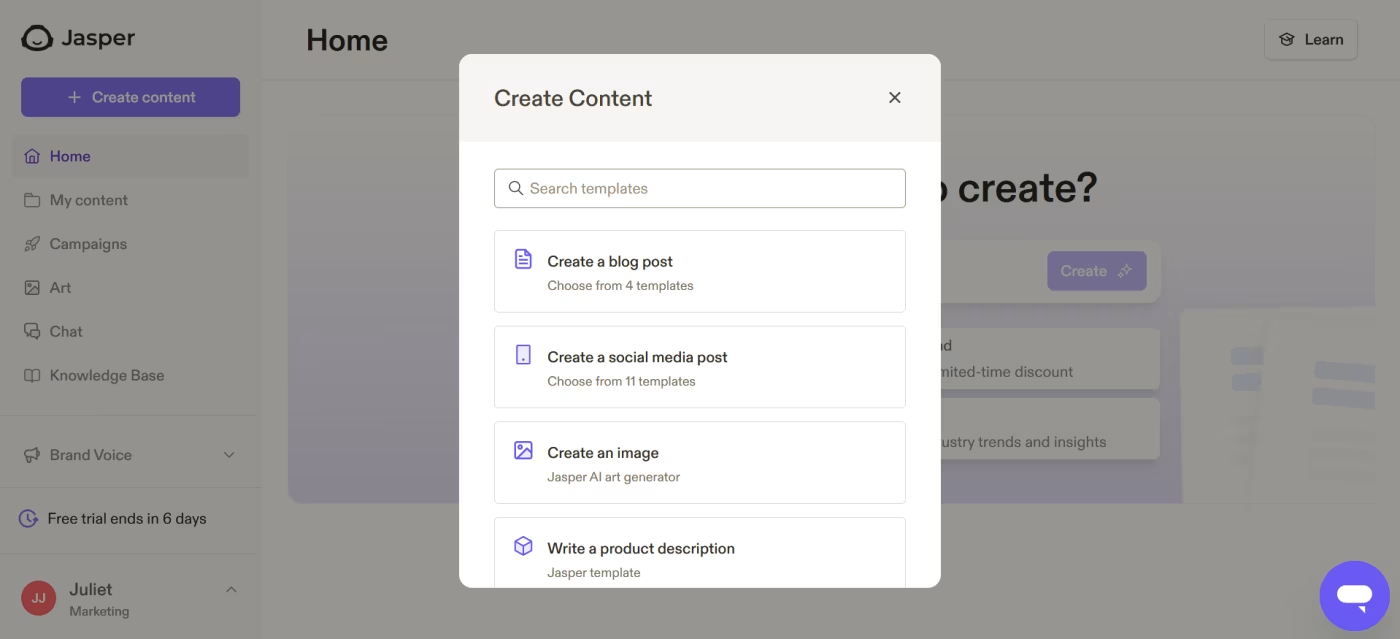
There's a big difference here: ChatGPT is an AI chatbot that's flexible enough to handle just about any task you throw at it, while Jasper is a specialized AI marketing tool. If you're not a marketer, you shouldn't be using Jasper.
Jasper offers a lot more step-by-step guidance than ChatGPT. Instead of having to do a ton of prompt engineering with ChatGPT, it'll hold your hand through the process. For starters, there are dozens of marketing templates—from email campaigns to product descriptions to blog articles—to speed up the content creation process and ensure you get targeted outputs.
Jasper will also prompt you to provide more details based on the desired content. For example, if you want to write a blog post, you'll enter the topic, audience, key points, and a CTA. You'd have to do this on your own in ChatGPT (unless you're using a GPT built specifically for this purpose).
Jasper does provide a chat-based interface like ChatGPT for interactive content generation. Unlike ChatGPT, though, it also offers additional support to help you write a strong prompt, including an Enhance prompt button and a library of content prompts.
Jasper integrates with Zapier, so you can connect it with thousands of other tools. Learn more about how to automate Jasper, or get started with one of these workflows.
Upload new Dropbox files to YouTube as videos with Jasper generated content
Create Jasper blog posts from new changes to specific column values in monday.com and save the text in Google Docs documents
Create product descriptions in Jasper from new or updated Airtable records
Jasper pricing: From $49/user/month
Read more: Jasper vs. ChatGPT
Which ChatGPT alternative should you use?
Which ChatGPT alternative is right for you really depends on what you need an AI chatbot for. If you want something similar to ChatGPT with a bit more focus on safety and ethical considerations, Claude is your best bet. On the other hand, if you use Google's Workspace apps, browser, and smartphone OS, Gemini is an obvious choice. If you want a chatbot to help you get work done, go with Zapier Central. Honestly, there's a case for every app on this list—that's why they're on the list.
While paid plans are now standard, each chatbot has some kind of free plan or trial. So, if you're not sure which one is the best alternative to ChatGPT for you, give a few of them a go and find out.
Read more:





